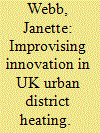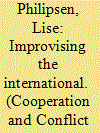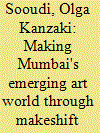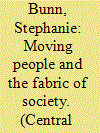|
|
|
Sort Order |
|
|
|
Items / Page
|
|
|
|
|
|
|
| Srl | Item |
| 1 |
ID:
137720


|
|
|
|
|
| Summary/Abstract |
Research on district heating has focused on technical-economic appraisal of its contribution to energy and carbon saving in urban centres. There is however lack of analysis of political and social processes which govern its actual take up. This paper examines these processes through a case study of Aberdeen, Scotland. Interviews and documentary analysis are used to examine the 2002 development of Aberdeen Heat and Power (AHP), an independent energy services company (ESCo). Technical-economic feasibility was a necessary component of appraisal, but not sufficient to govern decision-making. In the UK centralised energy market, DH investment is unattractive to commercial investors, and local authorities lack capacity and expertise in energy provision. In Aberdeen, the politics of fuel poverty converged with climate politics, creating an a-typical willingness to innovate through improvisation. The welfare priority resulted in creation of a non-profit locally-owned ESCo, using cost- rather than market-based heat tariffs. AHP has developed three combined heat and power energy centres and heat networks, supplying 34 MWh/pa of heat. Carbon savings are estimated to be 45% in comparison with electric heating, and heating costs are reduced by a similar amount. The conclusion outlines potential policy improvements.
|
|
|
|
|
|
|
|
|
|
|
|
|
|
|
|
| 2 |
ID:
173739


|
|
|
|
|
| Summary/Abstract |
In this article, I argue that the introduction of ethnography to International Relations has not taken full advantage of the potential of bringing these two fields together. Using international intervention as an example, I suggest that to bring out this potential we need to be more attentive to the classical virtues of ethnography. This means taking the subjects of our studies much more seriously, as people capable of making sense of and reacting to the structures of power they are embedded in. Here implementers tasked to put international policies into action in relation to a concrete context provide an overlooked source of knowledge. Using their experiences, reflections and ways of dealing with the concrete dilemmas that arise in their daily work enables us to analyse intervention as concrete relations of power that play out, affect and are mitigated by people in the field. Seeing knowledge as in this manner arising from the field provides a deeper knowledge that is necessary if we want to read intervention not only as an exertion of power from the international to the local, but as dynamically reshaped, resisted and made sense of in the field.
|
|
|
|
|
|
|
|
|
|
|
|
|
|
|
|
| 3 |
ID:
144364


|
|
|
|
|
| Summary/Abstract |
India's art world has garnered significant attention as an ‘emerging art world’, but we know little about how such worlds emerge and are experienced by those working within them. This article explores this question of ‘emergence’ through an ethnography of the Mumbai art world. Gallerists, artists and other insiders generally perceive local conditions as insufficient and in-the-making. They juxtapose Mumbai against idealised, more established art worlds, and engage in creative, improvised ‘makeshift’ practices to remedy the limitations they see. Despite their provisional nature, these makeshift practices produce new spaces, networks and mediators in the Mumbai art world: in other words, art worlds emerge through practice.
|
|
|
|
|
|
|
|
|
|
|
|
|
|
|
|
| 4 |
ID:
107547


|
|
|
|
|
| Publication |
2011.
|
| Summary/Abstract |
This article explores the relationship between continuity and change in Central Asian domestic felt textile production. In order to set this in the context of a pastoralist perspective, the paper draws on regional practices such as oral poetry and movement through landscape, as well as human-environment relations in order to reveal the dynamic and creative improvisatory process through which local textile production can be understood. In so doing, it examines whether Euro-American anthropology's rejection of a 'static' notion of 'tradition' for one of hybridity (reflecting a critique of its own nostalgia), has inadvertently moved us away from a focus on the historical narratives of those we study, which is often at odds with their own concerns. The author argues that for 'moving people', it is the dynamics of orality, human-environment relations and the practice (rather than the evidence) of material culture that elucidates our understanding of the relationship between continuity and change. The power of felt is thus reflected in the apparently ephemeral, non-enduring, aspects of these practices, which are what makes them endure, continuously bringing the past into being for new cultural futures.
|
|
|
|
|
|
|
|
|
|
|
|
|
|
|
|
|
|
|
|
|